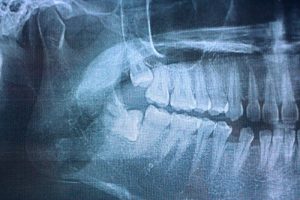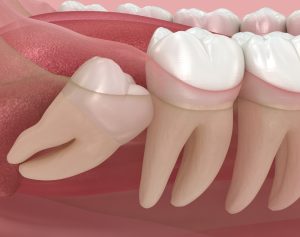Safe, Comfortable Wisdom Tooth Removal at Pristine Dental
When wisdom teeth cause pain, crowding, or oral health complications, professional extraction provides relief and prevents future dental problems. At Pristine Dental in Scottsdale, Dr. Stephanie Smith and Dr. Keith Cooper combine advanced surgical techniques with gentle patient care to make wisdom tooth removal as comfortable and stress-free as possible. Our state-of-the-art facility serves patients throughout Paradise Valley, Fountain Hills, and Phoenix with same-day appointments and comprehensive aftercare support.
Ready to address problematic wisdom teeth? Call our dental clinic near you at (480) 935-2424 to schedule your consultation and discover why families throughout the Scottsdale area trust us for safe, effective oral surgery.
Specialized Expertise in Oral Surgery From Dr. Cooper
At Pristine Dental, our doctors bring exceptional credentials and extensive experience to every wisdom tooth extraction procedure. Dr. Keith Cooper’s advanced training as a board-certified prosthodontist and Diplomate of the International Congress of Implantologists provides patients with surgical expertise that goes far beyond routine extractions. Combined with Dr. Stephanie Smith’s comprehensive dental training and gentle approach, our team delivers the highest standard of oral surgical care in Scottsdale.
Both doctors stay current with the latest advances in oral surgery through continuing education and professional development, bringing patients the most effective and comfortable treatment options available. Our commitment to clinical excellence means you receive care that meets the highest standards of modern dentistry.
What Are Wisdom Teeth Extractions and Why Are They Needed?
 Wisdom teeth extractions are surgical procedures that remove one or more third molars, commonly known as wisdom teeth, when they cause problems or pose risks to oral health. These teeth typically emerge between ages 17 and 25, but often lack adequate space in the mouth, leading to impaction, crowding, or other complications that require professional removal.
Wisdom teeth extractions are surgical procedures that remove one or more third molars, commonly known as wisdom teeth, when they cause problems or pose risks to oral health. These teeth typically emerge between ages 17 and 25, but often lack adequate space in the mouth, leading to impaction, crowding, or other complications that require professional removal.
Most people develop four wisdom teeth, though some individuals may have fewer or none at all. When wisdom teeth have sufficient space to emerge properly and can be cleaned effectively, extraction may not be necessary. However, the majority of patients require removal due to inadequate jaw space, problematic positioning, or difficulty maintaining proper oral hygiene around these teeth.
Types of Wisdom Tooth Extractions
Understanding the different types of wisdom tooth extractions helps patients prepare for their procedure and recovery process:
- Simple Extractions: Performed when wisdom teeth have fully emerged through the gum tissue and can be removed using standard dental instruments. These procedures typically require only local anesthesia and involve minimal surgical intervention.
- Surgical Extractions: Required when wisdom teeth are impacted, partially emerged, or positioned in ways that complicate removal. These procedures may involve incisions in the gum tissue, bone removal, or sectioning the tooth into smaller pieces for easier extraction.
- Impacted Wisdom Tooth Removal: Addresses teeth that cannot emerge properly due to insufficient space or abnormal positioning. Impacted teeth may be completely buried in bone, partially emerged, or angled against adjacent teeth.
- Multiple Extractions: When several wisdom teeth require removal, patients may choose to have multiple teeth extracted in a single appointment. This approach reduces the number of surgical procedures and recovery periods.
- Preventive Extractions: Performed before problems develop, typically recommended when orthodontic treatment is planned or when adequate space for proper cleaning cannot be maintained.
Your Wisdom Teeth Extraction Process at Pristine Dental
Our comprehensive approach to wisdom tooth removal prioritizes patient comfort and optimal outcomes through careful planning and execution:
- Initial Consultation and Examination: Dr. Smith or Dr. Cooper conducts a thorough evaluation, including digital X-rays or 3D imaging to assess tooth positioning, root development, and proximity to nerves and other structures.
- Treatment Planning Discussion: We explain findings, discuss extraction recommendations, and review sedation options to create a treatment plan that meets your individual needs and comfort preferences.
- Pre-Operative Preparation: Patients receive detailed pre-operative instructions, including dietary guidelines, medication protocols, and arrangements for transportation if sedation is used.
- Anesthesia Administration: Local anesthesia numbs the treatment area completely, with additional sedation options available for patients who prefer deeper relaxation during the procedure.
- Surgical Extraction: Using gentle techniques and specialized instruments, the doctor removes wisdom teeth while preserving surrounding tissues and minimizing trauma to adjacent structures.
- Post-Operative Care: Immediate post-surgical instructions include bleeding control, pain management, and wound care protocols to promote comfortable healing.
- Follow-Up Monitoring: Scheduled check-ups monitor healing progress, address any concerns, and provide ongoing support throughout the recovery process.
- Complete Recovery: Most patients experience full healing within 1-2 weeks, with return to normal activities possible within a few days following proper post-operative care.
Who Is a Good Candidate for Wisdom Teeth Extraction?
Wisdom tooth removal may be recommended for patients experiencing various oral health concerns or risk factors:
 Impacted Wisdom Teeth: Patients whose wisdom teeth cannot emerge properly due to insufficient space, abnormal positioning, or obstruction by other teeth benefit from extraction to prevent complications.
Impacted Wisdom Teeth: Patients whose wisdom teeth cannot emerge properly due to insufficient space, abnormal positioning, or obstruction by other teeth benefit from extraction to prevent complications.- Crowding and Alignment Issues: When wisdom teeth threaten to disrupt existing tooth alignment or interfere with orthodontic treatment results, preventive removal protects previous dental investments.
- Gum Disease and Infection Risk: Partially emerged wisdom teeth that cannot be cleaned effectively create bacterial harboring areas that increase risks of gum disease, tooth decay, and oral infections.
- Cyst or Tumor Development: Impacted wisdom teeth can develop cysts or other pathological conditions that require removal to prevent damage to adjacent teeth and bone structures.
- Orthodontic TreatmentPlanning: Patients undergoing braces or other orthodontic treatments may require wisdom tooth removal to create adequate space for proper tooth movement.
- Preventive Care Considerations: Young adults whose wisdom teeth are developing in problematic positions may benefit from early removal before complications develop and roots fully form.
During consultation, our doctors evaluate individual circumstances, including tooth positioning, oral hygiene ability, and overall oral health status, to determine appropriate treatment recommendations.
Benefits of Professional Wisdom Teeth Extraction
Professional wisdom tooth removal at Pristine Dental provides numerous advantages for long-term oral health:
- Prevention of Dental Complications: Removing problematic wisdom teeth prevents crowding, tooth damage, and alignment issues that can affect the entire mouth and compromise previous dental work.
- Improved Oral Hygiene: Extraction of hard-to-reach wisdom teeth eliminates bacterial harboring areas and makes daily brushing and flossing more effective for maintaining optimal oral health.
- Pain and Discomfort Relief: Patients experiencing wisdom tooth pain, pressure, or recurring infections find immediate and lasting relief following professional extraction procedures.
- Reduced Risk of Gum Disease: Removing wisdom teeth that cannot be properly cleaned reduces the risk of periodontal disease that can spread to other areas of the mouth.
- Protection of Adjacent Teeth: Extraction prevents wisdom teeth from damaging neighboring molars through pressure, decay transmission, or root resorption that can compromise healthy teeth.
- Prevention of Cyst Formation: Early removal of impacted wisdom teeth prevents the development of cysts or tumors that can cause significant damage to the jawbone and surrounding structures.
- Orthodontic Stability: Wisdom tooth removal helps maintain orthodontic treatment results and prevents relapse of tooth alignment that can occur when third molars exert pressure on other teeth.
- Enhanced Quality of Life: Patients report improved comfort, confidence, and overall oral health satisfaction following successful wisdom tooth extraction procedures.
Wisdom Teeth Extraction vs. Monitoring: Making the Right Choice
Understanding when wisdom tooth extraction is necessary versus when monitoring may be appropriate helps patients make informed decisions about their oral health care. Not all wisdom teeth require removal, and our doctors carefully evaluate individual circumstances to recommend the most appropriate approach.
Key Factors in Treatment Decision-Making
 Extraction Recommended When: Wisdom teeth cause pain, create cleaning difficulties, show signs of decay or gum disease, threaten adjacent teeth, or demonstrate impaction that prevents proper emergence.
Extraction Recommended When: Wisdom teeth cause pain, create cleaning difficulties, show signs of decay or gum disease, threaten adjacent teeth, or demonstrate impaction that prevents proper emergence.- Monitoring May Be Appropriate When: Wisdom teeth have adequate space, emerge properly, can be cleaned effectively, show no signs of pathology, and do not interfere with orthodontic stability.
- Professional Assessment: Dr. Smith and Dr. Cooper use advanced imaging and clinical examination to evaluate tooth positioning, development stage, and risk factors that influence treatment recommendations.
- Timing Considerations: Younger patients often experience easier extractions and faster healing, making early intervention beneficial when problems are anticipated rather than waiting for complications to develop.
Caring for Your Mouth After Wisdom Teeth Extraction
Proper post-operative care plays a crucial role in comfortable healing and successful outcomes following wisdom tooth extraction. Our team provides comprehensive aftercare instructions and ongoing support throughout the recovery process.
Immediate Post-Operative Care (First 24-48 Hours)
- Bleeding Control: Apply gentle pressure with gauze pads as directed, replacing them when saturated. Most bleeding subsides within the first few hours following surgery.
- Pain Management: Take prescribed or recommended pain medications as directed, beginning before anesthesia wears off to maintain comfort levels throughout initial recovery.
- Ice Application: Apply ice packs to the outside of your face for 15-20 minutes at a time during the first 24 hours to minimize swelling and discomfort.
- Rest and Activity Limitation: Avoid strenuous activities, exercise, and heavy lifting for at least 24-48 hours to prevent bleeding and promote healing.
- Dietary Guidelines: Stick to soft, cool foods and liquids, avoiding hot, spicy, or hard foods that could irritate extraction sites or dislodge blood clots.
Ongoing Recovery Care (Days 3-14)
- Oral Hygiene: Gently brush teeth while avoiding extraction sites, and begin gentle salt water rinses 24 hours after surgery to promote healing and prevent infection.
- Diet Progression: Gradually introduce more substantial foods as comfort allows, continuing to avoid hard, crunchy, or sticky foods that could interfere with healing.
- Follow-Up Appointments: Attend scheduled check-ups to monitor healing progress and address any concerns that may arise during recovery.
- Activity Resumption: Most patients can return to normal activities within three to five days, with complete healing typically occurring within one to two weeks.
Wisdom Teeth Extraction Costs and Payment Options
The investment in wisdom tooth extraction varies depending on several factors, including the complexity of the procedure, the number of teeth removed, and the type of dental sedation used. While costs may initially seem significant, the benefits of removing problematic wisdom teeth extend far beyond immediate relief to include prevention of future dental complications and associated expenses.
Insurance and Financing Options
 Most dental insurance plans provide coverage for medically necessary wisdom tooth extractions, particularly when teeth are impacted or causing oral health problems. Our knowledgeable staff works with families to maximize insurance benefits and provides clear explanations of coverage details and patient responsibilities.
Most dental insurance plans provide coverage for medically necessary wisdom tooth extractions, particularly when teeth are impacted or causing oral health problems. Our knowledgeable staff works with families to maximize insurance benefits and provides clear explanations of coverage details and patient responsibilities.
For patients needing assistance with treatment costs, we offer flexible payment plans and financing options to make wisdom tooth extraction accessible. Health Savings Accounts (HSA) and Flexible Spending Accounts (FSA) can also be used for oral surgery expenses, providing additional financial flexibility.